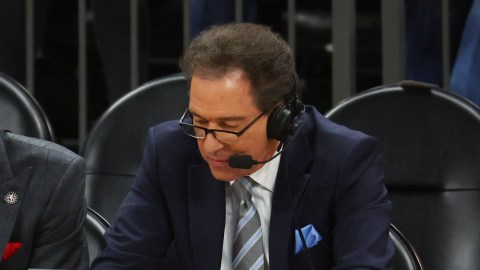In just 140 characters, Twitter can do a lot of good and a lot of bad.
With millions of users ranging from celebrities and large corporations to your regular, everyday people, Twitter holds a bevy of information. While it can serve as a news source, and legitimate information does get tweeted, Twitter is also a breeding ground for rumors, false information and parody accounts looking to trip people up.
Miami's FOX affiliate WSVN fell into the fake Twitter trap Thursday night when they reported that Ray Allen had signed a 3-year $11 million deal with the Miami Heat. The problem? Their source was a fake Twitter account and the deal hadn't actually happened.
This false report is problematic for a couple of reasons. One, the media has the responsibility to deliver reliable and accurate news to their audience. Though WSVN took to Twitter, the very same platform that led to their blunder in the first place, to apologize for jumping the gun with the false report, an apology doesn't make up for the fact that the error occurred in the first place.
For every apology that a media outlet has to make, they lose a bit of credibility. When the media releases information, they need to make sure that what they are putting out is accurate, from looking for grammar and spelling mistakes to using legitimate sources and checking facts.
Of course mistakes do get made, but to let something so large as not properly checking out the source slide is unacceptable. While it's important to get news up quickly, doing so should not compromise the quality of the report. The audience relies on the media to get correct information and when a news outlet has to repeatedly apologize for mistakes in its reporting, they begin to lose their credibility and the audience stops turning to them to get information.
Secondly, this was an error that WSVN should have caught. Their source was a parody account of Yahoo! Sports' Adrian Wojnarowski. The real Adrian Wojnarowski's account is verified through Twitter, something many celebrities, athletes and news outlets do to prove that it is really them and not a parody account. The verified symbol, a blue circle with a check mark next to the name, distinguishes between the real accounts and the fake ones and would not be found on any of the fake Wojnarowski profiles.
It's easy to be fooled by fake accounts, especially when they have virtually the same profile — including background and photo — as the real one. However, in this case, WSVN could have caught the difference with a quick scan of the account's Twitter page and avoided the whole debacle.
This mistake is just the latest Twitter-related misstep the media has faced in recent days.
ESPN analyst Chris Broussard came under fire for a tweet regarding NBA free agent Eric Gordon and the Phoenix Suns earlier in the week. Gordon released a statement announcing the news that he was committing to the Suns. Minutes later, Broussard was on Twitter with the news, using almost the exact same phrasing as the statement, and said that "Gordon told him."
Broussard was almost immediately assailed by people — on Twitter, of course — calling him out for trying to pass the information from the statement off as his own and not crediting the source. Broussard isn't likely to get in trouble for the way he presented his information, but it certainly created a bit of an embarrassing situation for him.
Twitter can be problematic and lead to embarrassment — as WSVN and Broussard recently discovered — but it's also a great tool when it is utilized properly. It's a great way to find and share information at lightning-quick speed. Breaking news can be put up and delivered in a few clicks, and that news can go viral and spread around the world even faster. However these advantages can also be downfalls if not executed properly.
Twitter is a tool and it's a tool that the media — and everyone else — needs to exercise a level of caution with when using it. Once the news is out, it's out. You can delete your tweets and apologize all you want, but as WSVN and Broussard know, once you put the news out there, you're going to have a hard time reeling it back in and gaining control of the situation.
Everyone on Twitter, from the media to celebrities, athletes and everyday people, needs to stop and think before they tweet or retweet information on Twitter. A couple of clicks can spread information quickly throughout the world, and whether that information is accurate or not can determine whether that's good or bad.
Photo via Twitter/@the_girl_loves



